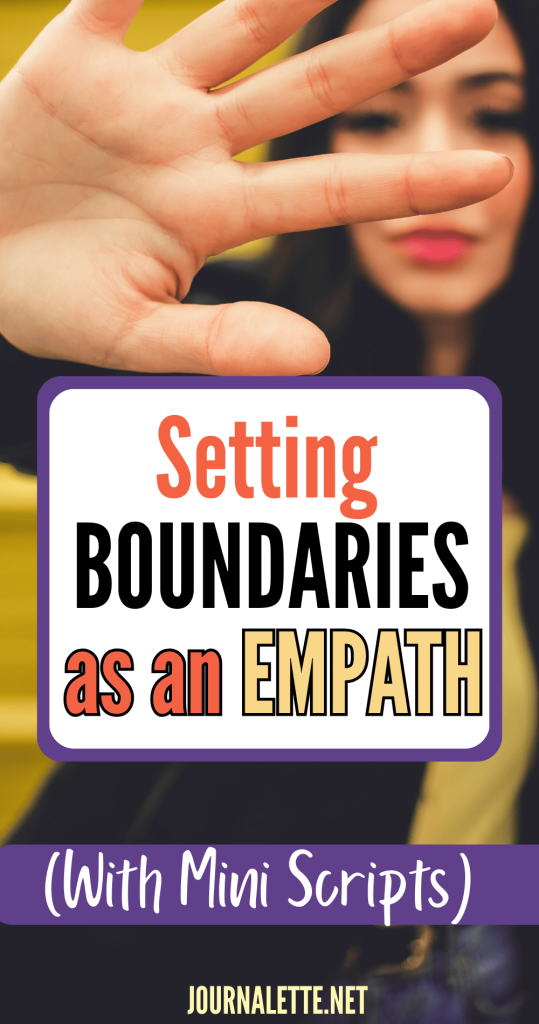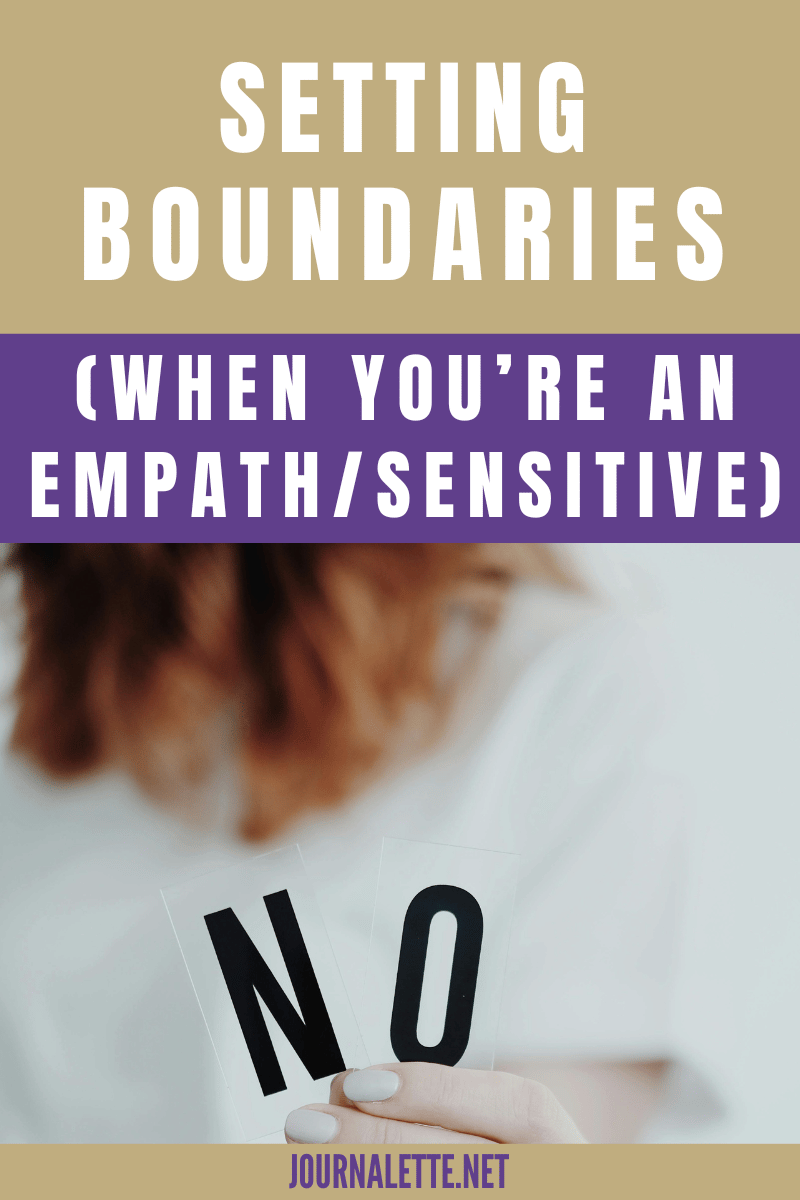“Just say no,” people tell you. But boundary setting for empaths is not so simple. This also goes for caregivers or over-givers (I’m all 3).
It feels like rejection or selfishness or like you’re betraying someone who needs you. But the truth is, when you don’t set (or enforce) boundaries, the main person you’re betraying is yourself.
I keep asking myself:
Why do my boundaries collapse so quickly?
The truth:
I abandon myself before I even realize it. Often, I say yes, even at times when my body is screaming no. I’ve noticed I also soften my voice to keep the peace. The worst thing I do: disappear so no one else has to feel uncomfortable.
Boundaries don’t start with “no.”
They start with noticing when you’re ghosting yourself.
Why it feels impossible to set (and keep) boundaries
-
Your body is wired for harmony. You feel other people’s emotions. Saying no can feel like creating a storm.
-
At some point (predictably, probably in childhood, you were praised for disappearing. Be helpful. Be flexible. Be good. Over time, goodness started to mean self-erasure.
-
Rejection feels life‑threatening. Your nervous system reads potential conflict as danger. Of course, you avoid it. Of course, you over‑give. Survival makes sense.
Nothing is “wrong” with you.
Your system is doing its job.
I’m sharing tips (and mini-scripts) for setting boundaries with the people in your life who you have a non-toxic relationship, such as most friends and family. Use your discernment. People who are toxic or abusive are in a different category. This blog post is NOT for those situations. The same goes for responding to strangers who attempt to intercept your personal boundaries. Your safety is always. always. paramount.
Three tiny shifts I’m practicing
1) Noticing my body
That knot in your stomach? That tight jaw? The subtle dread in your chest?
That’s the boundary speaking.
Practice: before you answer any request, take a moment. Inhale for 4, exhale for 6, twice. Ask: What is my body saying? If it says no, believe it—even if your mind complains.
2) Pausing before I promise
Urgency is a boundary thief. It pushes you into agreements you don’t have the capacity for.
Practice: use a buffer phrase:
-
“Let me check and get back to you tomorrow.”
-
“I need a moment to look at my week.”
-
“I’ll reply by noon.”
Space = sovereignty. Most boundary collapses happen because we answer too quickly.
3) Redirecting (instead of collapsing).
A boundary isn’t always a hard wall. Sometimes it’s a door swinging on small hinges.
Try these: “yes, but smaller” moves:
-
“I can’t do the whole thing, but I can do X.”
-
“I can help for 20 minutes, not the full hour.”
-
“I can start next week, not today.”
Small is still real. Small holds.
Mini-scripts that don’t feel like a fight
(You don’t owe anyone a dissertation. Keep it tender and clear).
-
Gentle No: “I can’t take this on right now.”
-
Capacity Truth: “I don’t have the bandwidth for that.”
-
Reschedule: “I want to give this proper attention. Can we revisit on Friday?”
-
Protecting the Day: “Today is already full. I can look at options tomorrow.”
-
When you already said yes (and regret it): “I said yes too quickly. I need to step back and adjust what I can offer.”
Say the line.
Then stop talking.
Silence is a boundary, too.
The Boundary Ladder (start small, climb steadily)
Imagine you’re slowly climbing levels as you gain your boundaries bearings (aka confidence).
Level 1 Pause:
No commitments in the moment. Always “I’ll get back to you.”
Level 2 Limit:
Shorten time/energy: 15–20 minutes, not an hour. One task, not five.
Level 3 Remix:
Offer an alternative that honors you: a later date, a smaller scope, a different format.
Level 4 Withdraw:
A clear no. “I’m not available for this.” (You don’t need a reason.)
You don’t have to jump to Level 4 today.
Climb one rung of the ladder. Then another.
When guilt shows up (because it will)
Guilt does not mean you did something wrong.
Often, guilt is just your conditioning leaving your body.
Reframe:
-
Guilt = a growth signal.
-
Guilt = my old pattern protesting the new boundary.
-
Guilt = evidence that I didn’t abandon myself this time.
Whisper to yourself:
“I can survive their temporary discomfort. I’m choosing not to disappear.”
A 90‑second body reset before the hard conversation
-
With both feet on the floor..
-
Press thumb + forefinger together on each hand.
-
Inhale through the nose for 4. Exhale through the mouth for 6. Repeat 5 times.
-
Name three sensations you feel (solid pen, soft sweater, moving air).
-
Speak your boundary from this steadier place.
Your body leads. Your words follow.
Repeat.
Your body leads. Your words follow.
If the requester reacts badly
Their reaction lives in their nervous system, not yours.
You are responsible for clarity—not for their comfort.
Try:
“I hear that this is disappointing. My decision stands.”
or
“I get that you hoped for a yes. I still don’t have capacity at this moment.”
Don’t get into a defence mode where you’re debating and arguing. Repeat your line as needed. Exit if you need to.
What to do if you slipped and said yes, but your body says no.
It happens. You’re human.
-
Name it quickly: “I said yes too fast.”
-
Adjust the scope: “Here’s what I can offer instead.”
-
Anchor the lesson: write one sentence in your journal: Next time I’ll pause before I promise.
Repair is a boundary, too.
Boundary phrases you can steal (copy/paste)
“That doesn’t work for me.”
“I can’t add anything else to my plate.”
“This is outside my role.”
“I need to slow this down.”
“I’m not available for that conversation.”
“I’ll think on it and reply tomorrow.”
“Yes, but smaller: I can do X, not Y.”
Put 2–3 of these in your notes app. Or print the Boundaries pocket journal from the Self-Care Library.
Use them when you freeze.
The quiet win you may not notice
Boundaries rarely feel triumphant at first.
They can feel wobbly. Awkward. Like you’re breaking a rule.
But here’s the quiet win: you didn’t betray yourself.
Even for 30 seconds.
Even for one small sentence.
Every boundary you hold—no matter how tiny—is you learning to stay.
I’m not perfect at this.
I still abandon myself sometimes.
But every time I pause, breathe, and choose a truer sentence, something in me unclenches.
I come back. I remain.
That’s the point.
Not perfection. Presence.



Leave Your Comments